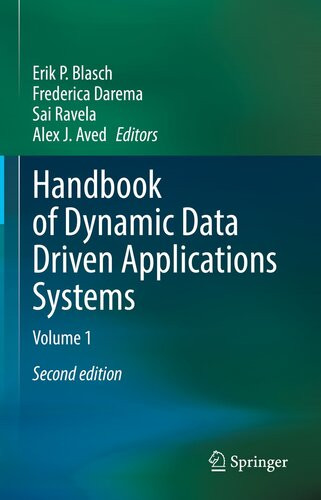

Most ebook files are in PDF format, so you can easily read them using various software such as Foxit Reader or directly on the Google Chrome browser.
Some ebook files are released by publishers in other formats such as .awz, .mobi, .epub, .fb2, etc. You may need to install specific software to read these formats on mobile/PC, such as Calibre.
Please read the tutorial at this link: https://ebookbell.com/faq
We offer FREE conversion to the popular formats you request; however, this may take some time. Therefore, right after payment, please email us, and we will try to provide the service as quickly as possible.
For some exceptional file formats or broken links (if any), please refrain from opening any disputes. Instead, email us first, and we will try to assist within a maximum of 6 hours.
EbookBell Team

4.3
8 reviewsThe Handbook of Dynamic Data Driven Applications Systems establishes an authoritative reference of DDDAS, pioneered by Dr. Darema and the co-authors for researchers and practitioners developing DDDAS technologies.
Beginning with general concepts and history of the paradigm, the text provides 32 chapters by leading experts in ten application areas to enable an accurate understanding, analysis, and control of complex systems; be they natural, engineered, or societal:
The authors explain how DDDAS unifies the computational and instrumentation aspects of an application system, extends the notion of Smart Computing to span from the high-end to the real-time data acquisition and control, and manages Big Data exploitation with high-dimensional model coordination.
The Dynamically Data Driven Applications Systems (DDDAS) paradigm inspired research regarding the prediction of severe storms. Specifically, the DDDAS concept allows atmospheric observing systems, computer forecast models, and cyberinfrastructure to dynamically configure themselves in optimal ways in direct response to current or anticipated weather conditions. In so doing, all resources are used in an optimal manner to maximize the quality and timeliness of information they provide.
Kelvin Droegemeier, Regents’ Professor of Meteorology at the University of Oklahoma; former Director of the White House Office of Science and Technology Policy
We may well be entering the golden age of data science, as society in general has come to appreciate the possibilities for organizational strategies that harness massive streams of data. The challenges and opportunities are even greater when the data or the underlying system are dynamic - and DDDAS is the time-tested paradigm for realizing this potential.
Sangtae Kim, Distinguished Professor of Mechanical Engineering and Distinguished Professor of Chemical Engineering at Purdue University